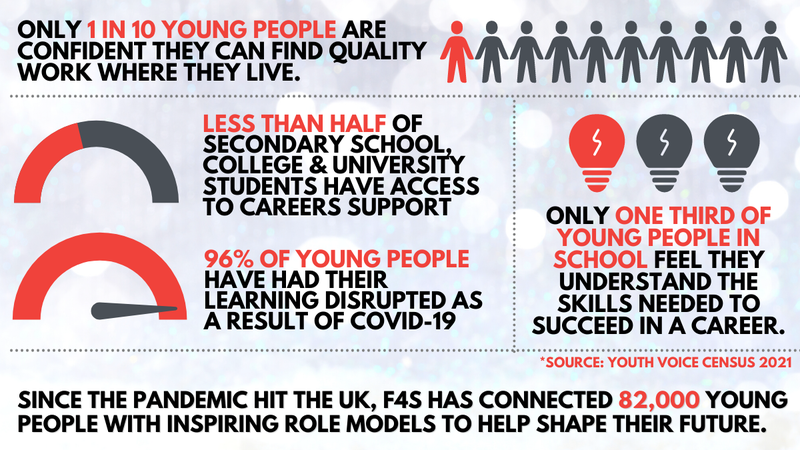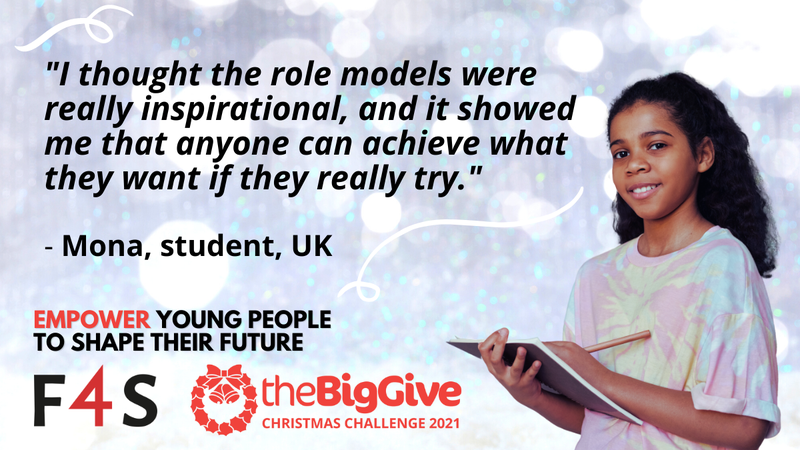Empower young people to shape their future
4 Dec 2021
Earlier this year, the 2021 youth voice census highlighted the outcome of the pandemic and what effects it had on young people, and the research that involves their career prospects is powerful. This week, as part of our drive for the Big Give, we summarised some statistics we think should be top of mind and directly relevant to everyone concerned with careers education, youth employment and general support to students and graduates.

Since March 2020, we’ve seen a decrease in career support in schools, work experience opportunities and other extracurricular ways in which young people can grow their skills. Students feel they have a lot to catch up on in terms of skills and career support, as well as a loss of opportunity.
With access to careers support dropping, young people look for help to know what skills employers need, what skills they should cultivate, and we need to do a better job of showcasing and providing them with work opportunities close to where they live. When asked who they go to for career support, an overwhelming majority rely on teachers and a much higher proportion of parents than before, but only 5.3% would rely on actual employers to help shape their career skills.
Meanwhile, a new study by the Social Mobility Foundation correlates success in the job market with where young people are from and what their parents do for a living. The claim is that social mobility - although so much is done to help employ and build disadvantaged groups via initiatives such as the Kickstart Scheme - is still a very real issue. Not only does background impact salary levels or number of opportunities a student has, but also things like whether students go to university at all, and their ability to negotiate higher-level jobs based on unpaid work experience.
Much of this evidence confirms our worries - and unfortunately the fact is that lack of career education support inevitably affects social mobility. But we can turn the trend around if enough people decide to actively support, be aware of the issues and adjust things they do on a small scale to affect the bigger picture.

For example, if more young people from underserved backgrounds can meet with role models as part of events like the ones F4S holds for free - it can make all the difference in their perception of what they can do. Students like Mona (see image) could understand not just how big to dream, but how others have gone about pursuing their dreams. After all, as we wrote in a previous article, we are part of the human race, and we learn from mimicking our peers, our elders, and our role models.
We know there is ample evidence that role models have a significant positive effect on young people. With that in mind, together with research that shows a need for support, we are proud that during the period July 2020 - Jun 2021 F4S saw a 340% increase in total employer student interactions, and 82% of students in these events believed F4S helped them understand the pathway to a career. On top of that, 83% of students said career events inspired them to learn new skills, and 91% of educators said that F4S is a helpful tool for delivering careers provision. Let’s not forget that this activity happened in a year when we urgently moved from physical to digital events being held online.
Since the pandemic broke in March 2020, we have facilitated 130.000 business role model encounters with students, and supported over 82.000 students all over the UK. We strive to continue the work we are doing, to scale it to every young person in the UK, and to work against the forces that are driving some of the negative impacts touched on in this article - but we cannot do it alone. That is why we are part of the Big Give Christmas Challenge, through which you can join in our efforts to support young people across the UK.
>> Donate today before 7th December, and your donations will have twice the impact.
If you are not in a position to donate, here are some other ways in which you can help:
- As an employer, consider hosting a work placement, project, internship or work experience to a young person in the coming year - we have all the tools to support you via our partner Workfinder! >> Read more here
- Become a role model and speak about your career path at one of our many F4S Events
- As an educator or teacher, book your very own F4S event!
At the end of the day we are talking about awareness - whatever you do, remember that you have the power to inspire the next generation to shape their future.
Thank you for reading, and best wishes,
The team at F4S